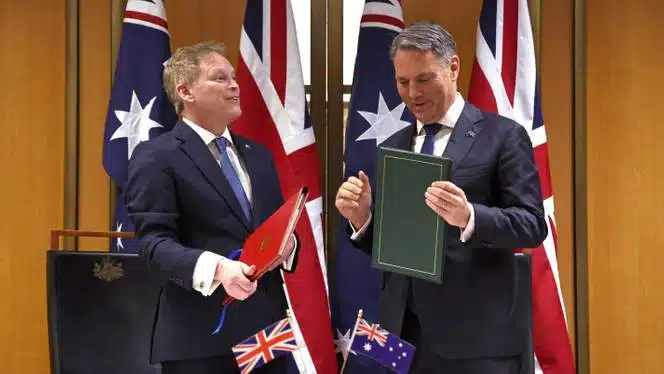The contract has clauses like the combined training of Ukrainian troops in the UK that facilitate smoother operations between the respective military in each other’s nations.
The defense ministers of Australia and the United Kingdom signed a new defense and security cooperation pact, stating that it was necessary to address “contemporary challenges” in order to uphold the global rules-based system.
Following yearly bilateral ministerial defense talks in Parliament House in Canberra on Thursday, the treaty was signed by Australian Defense Minister Richard Marles and his UK counterpart Grant Shapps. The Australia-UK Ministerial (AUKMIN) meeting was first conducted in 2006.
“Australia and the UK have a dynamic and enduring relationship,” Marles stated in a written statement on Thursday. “We continue to work closely together to support a global rules-based order, from the UK’s leadership of support for Ukraine and efforts to address the Houthi threat, to increasing contributions in the Pacific and the Indo-Pacific.”
The statement read, “We must modernize our most important partnerships as the world becomes more complex and uncertain.”
According to Shapps, the treaty formalizes the two nations’ consultation process on matters pertaining to each other’s sovereignty and regional security.
At a joint press conference with Marles on Thursday at Parliament House in Canberra, Shapps stated, “I think one of the most important elements is it describes a mechanism by which we consult when either of our countries are under threat and we have those discussions more formalized than it is at the moment.”
It should be noted that we already collaborate extensively on defense-related issues. Thus, we’ll constantly be seeking to strengthen our nations’ cooperation.
AUKUS coalition
The agreement also covered other areas, such as increased cooperation on underwater warfare, intelligence, and military exercises, as well as ongoing cooperation on capability development, particularly through the AUKUS alliance.
It is unlikely that other regional countries, particularly China, were surprised by the pledge made at the AUKMIN summit last year in the UK to update the bilateral defense pact.
Beijing has consistently and vehemently opposed defense alliances with countries that it believes are trying to limit its ambitions in the South East Asian and South Pacific regions.
Earlier this week, Australia had the highest-ranking Chinese politician to visit in seven years, and the two foreign ministers discussed security and stability in the region as top priorities.
China’s Wang Yi made the following comments in his opening remarks prior to Tuesday’s bilateral meeting: Australia should continue to pursue a “independent” foreign policy and should not permit “third parties” to sour relations with the nation.
Many saw the remarks as a barely concealed jab at the US, which Beijing frequently claims is forming a new military alliance called AUKUS, which also includes the UK, in order to restrain China’s ambitions in the Asia-Pacific area.
The development of nuclear-powered submarines by the Australian government under the AUKUS accord remains a specific area of contention for China-Australia ties, which are currently on the mend following a few chilly years.
SOURCE: TRTWORLD






